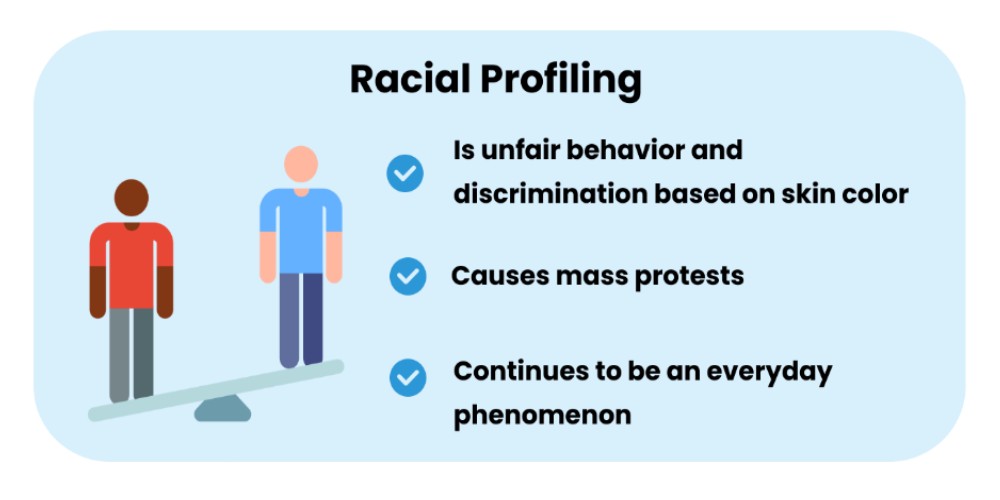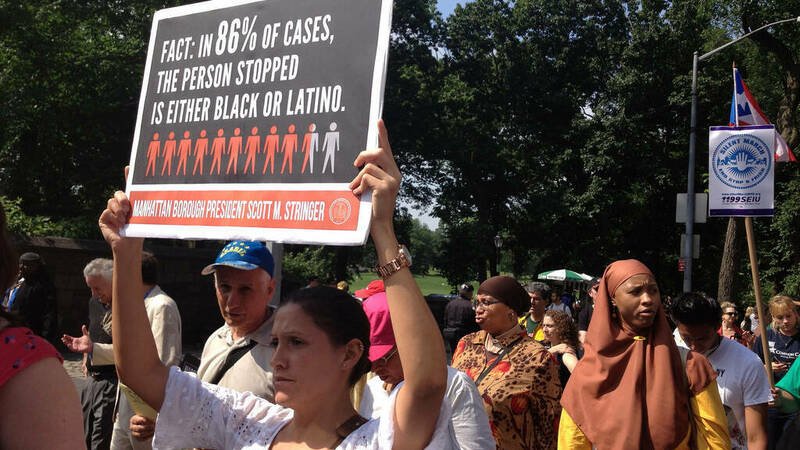Racial Profiling Essay: Outline, Examples, & Writing Tips
Racial profiling is not uncommon. It’s incredibly offensive and unfair behavior that causes most of the protests in support of people of color. It occurs when people are suspected of committing a crime based on their skin color or ethnicity.

Unfortunately, most people are unaware that racial profiling is an everyday phenomenon that harms both the victims and society. Therefore, it’s crucial that we highlight this issue in as many ways as possible. One of the options is expressing your opinion through writing. A racial profiling essay can be inspiring and persuasive. All the power is in your hands, so let’s figure out how to use it! Keep reading this guide made by Custom-writing.org experts.
The article contains a writing guide, a collection of racial profiling essay topics, ideas, and examples, as well as the tips on making a racial profiling essay outline. We hope that it will inspire you to make an A+ argumentative racial profiling essay or even a persuasive speech on the topic!

🤔 What Is a Racial Profiling Essay about?
- 📑 Making an Outline
- 👌 Writing Tips
📝 Racial Profiling Essay Examples
🔗 references.
There is more than one objective for writing a racial profiling essay. First of all, it can be as simple as expressing your feelings about it. For example, you might consider pointing out how unfair and unjustified those actions are. Moreover, if you’re a law student, you should definitely back up those conclusions with the extractions from the Constitution.
You can then focus on describing the impact it has on society, which makes a fantastic cause and effect essay. There are so many more topic ideas, but if you’re feeling stuck, go ahead to the article’s next sections!
Argumentative Racial Profiling Essay
To write a successful argumentative racial profiling essay, you need to focus on investigating the topic to express your perspective later. Every statement you include in the main body of the writing should be supported by evidence. The essential part of such an essay is a clear thesis statement! And if you struggle to come up with a good one yourself, you can get help from a thesis statement generator online .
Persuasive Racial Profiling Essay
Unlike the type discussed above, a persuasive racial profiling essay should aim to convince your readers that your point of view is the only correct one. Instead of just presenting your point of view, you need to gather the most convincing facts that can influence your audience. It requires expertise in the topic of racial profiling.
Racial Profiling Essay Topics
Looking for a racial profiling essay topic ? Find a short and sweet topic collection below.
- The impact of racial profiling on the US society. For this essay, you would need to study how citizens react to racial profiling. You might also include some statistics from the previous years.
- Present your point of view on the issue of racial profiling. If you ever faced it yourself, your reflective essay would be even more powerful! Include as much evidence as you can.
- Racial profiling: are African Americans overreacting? Someone feels like people might be taking this issue too personally. Therefore, you should provide strong arguments to point out how discriminating those actions are.
- Accepting racial profiling as a common practice. Express your opinion on this topic. Do you think police should be legally allowed to practice racial profiling? Why would it be a violation of rights?
- Racial profiling from a psychological perspective. Try to analyze this occurrence as if you were a professional psychologist. What do you think makes law enforcement act this way?
- Does racism impact the US immigration?
- Discuss the definition and origins of racial profiling.
- Analyze the aim and values of the Black Life Matter movement.
- Racial stereotypes in Disney films.
- Examine the problem of workplace racism.
- How can racism in medicine be eliminated?
- What is the colorblind racism?
- Describe your personal experience of racism.
- Compare the ways South Africa and the US are handling racism.
- The goals of the Black Lives Matter movement.
- Explain why racism is a persistent problem in modern society.
- Explore the concept of racial profiling in the “war on drugs.”
- Childhood under the racist laws of apartheid in Trevor Noah’s Born a Crime .
- Discuss the effect of racism on child development.
- Is there a racial disparity gap in healthcare?
- Describe the problems racism causes in American schools.
- How does racism affect modern society?
- Racial stereotypes in music video.
- The pros and cons of racial profiling in the airports.
- Describe the specifics of colorblind racism.
- Discuss the possible solutions of racial profiling problem.
- Terrorist attacs in 9/11, hate crimes, and racial profiling.
- Is institutionalized racism a real problem or a myth?
- Racial and ethnical prejudices in breast cancer treatment.
- Examine the cases of racism against healthcare workers and their consequences.
- Analyze the impact of racism on globalization .
- Describe and characterize the main types of modern racism.
- Racial profiling of minority groups in the US.
- Is racial discrimination issue completely eliminated from American society?
- Evaluate the racial inequalities in the US judicial system.
- Describe how race relations are represented in Men We Reaped by Jesmyn Ward.
- Analyze the difference between individual and institutional racism.
- Investigation of the history of racism in The Case for Reparations by Coates.
- Is racial profiling a discrimination or a necessary evil?
- Ways of dealing with racism in American education.
- Examine the history of racial stereotypes in the US.
- Explain why racial profiling is a violation of human rights.
- Catastrophic consequences of discrimination and racial prejudice in the film A Soldier’s Story .
- Racism as a global issue.
- Discuss the causes and effects of racism in America.
- What can be done to resolve the problem of racism at interactional level?
- Analyze the issue of racial profiling of drivers.
- Describe the problem of racism and discrimination from the perspective of social psychology.
- Discuss the methods of solving the problem of policing racism.
- Examine the cases of racism in social work environment.
📑 Racial Profiling Essay Outline
Whichever type of racial profiling essay you choose to work on, the basic writing strategy remains the same. After you pick up the suitable title and finish your research, it’s time to reorganize the main ideas. The best way to do it is to create a racial profiling essay outline that serves as a foundation for your future essay.
There are three elements that any essay must have:
- Introduction
The main body should have at least three paragraphs in which you present your arguments supported by evidence.
Racial Profiling Essay Introduction
It is a good idea to start your essay with a hook – a statement that aims to grab your reader’s attention. In your racial profiling essay introduction, you could use some impressive statistics that illustrate the problem of racial discrimination or describe a real-life situation.
At this stage, it’s also essential that you think about composing a racial profiling thesis statement . It goes as the last sentence of the introduction and becomes the focal point of your whole writing. The thesis statement includes your opinion and a short description of your arguments.
Racial Profiling Essay Conclusion
In conclusion, you should summarize your arguments and paraphrase your racial profiling thesis statement. It is also a good idea to add some information about the most important findings. This way, your essay would be both informative and persuasive.
👌 Racial Profiling Essay: Writing Tips
Let us remind you of some basic rules you should stick to while writing:
- Introduce your position on the problem and, at least, three major points in the thesis statement of your racial profiling essay.
- Gather enough facts and pieces of evidence to support your points.
- Do not forget to study the arguments of the opposing side.
Before you get down to writing your essay on racial profiling, try to answer the following questions:
- When did racial profiling start?
- Why does it happen?
- What consequences does it lead to?
Try to find some statistical data to include in your essay on racial profiling. Be careful with sources and information. The point is that racial profiling is unconstitutional, which is why you will not find official data, something like police reports, etc. Thus, use only credible online and printed sources when writing your papers on racial profiling.
There is also a way to show your creativity in the essay on racial profiling. You may play the devil advocate’s role and support it in the paper on racial profiling. We are sure this unusual approach will impress your teacher!
Below you’ll find links to 3 racial profiling essay examples. We hope that they will inspire you to write an A+ paper on racism and discrimination.
The modern globalized society provides numerous opportunities for improved communication and increased mutual understanding. However, there are still such problems as discrimination on the basis of ethnicity, mentality, sex, or gender, biased attitudes to some minorities, and widespread stereotypical thinking.
Read the full text
The system of racism entails degrading and harmful actions and beliefs that are implemented and expressed by both groups of people. Racism over the years has been one of the reasons behind poverty and lack of access to social mobility in the United States.
Racial identity and racial socialization are proposed to promote the improvement of African American adolescents in the aspect of race-related difficulties. Current studies pointed out that discrimination is a condition that has harmful effects on the mental health of African Americans.
So, good luck with your papers on racial profiling! Do not hesitate to visit our blog if you have trouble with terrorism essays or any other written assignment.
- Racial Profiling: Definition | American Civil Liberties Union
- This is why everyday racial profiling is so dangerous – CNN
- Racial profiling – AP News
- Racial profiling: Germany debating police methods – DW
- Psychology responds to racial profiling
- Racial Profiling – Equal Justice Initiative
- Racial Profiling: Past, Present, and Future?
- Racial profiling | Independent
- Racial Profiling – University of Michigan Law School
- Share to Facebook
- Share to LinkedIn
- Share to email

Without a doubt, a natural disaster essay is a tough paper to write. To begin with, when people encounter a disaster risk, it’s a tragedy. Emergency situations can affect hundreds, thousands, and millions of people. These are the crises and events that change people’s lives drastically. So, disaster and emergency...

“You are not only responsible for what you say, but also for what you do not say”Martin Luther There are a lot of other good quotations that can serve as a good beginning for your essay on responsibility and provide good ideas for writing.

Exemplification essays, which are also called illustration essays, are considered one of the easiest papers to write. However, even the easiest tasks require some experience and practice. So, if you are not experienced enough in writing exemplification essays, you will face certain challenges.

You push the snooze button once again and finally open your eyes. It is already 8:50, and your classes start at 9. “I’m going to be late again!”— you think, already in full panic mode. In a minute, you rush out the door half-dressed, swallowing your sandwich on the go....

An essay about Harriet Tubman is to focus on the biography and accomplishments of a famous American abolitionist and political activist of the 19th century. Harriet Tubman was born into slavery, escaped it herself, and helped others escape it. She changed many jobs throughout her lifetime, being a housekeeper, a...

What is a documented essay and what is the purpose of it? It is a type of academic writing where the author develops an opinion relying on secondary resources. A documented essay can be assigned in school or college. You should incorporate arguments and facts from outside sources into the...

What is a reflexive essay? If you have just received the assignment and think there is a typo, you’re in the right place. Long story short, no, there is no mistake. You actually need to write a reflexive essay, not a reflective one. The thing is that reflective and reflexive...

Fairies and evil spirits, noble kings and queens, beautiful princesses and brave princes, mysterious castles and abandoned huts somewhere in a thick a wood… This is all about fairy tales. Fairy tales are always associated with childhood. Fairy tales always remind us that love rules the world and the Good...

Subjective or objective essay writing is a common task students have to deal with. On the initial stage of completing the assignment, you should learn how to differentiate these two types of papers. Their goals, methods, as well as language, tone, and voice, are different. A subjective essay focuses on...

Writing All About Me paragraph is probably one of the most usual assignments. For example, students might write it when entering an academic institution. Such work gives an opportunity to introduce yourself, your skills, and goals. However, it is not the only possible situation.

Coral reefs can be called one of the most amazing things created by nature. These structures can be found in tropical and temperate waters. Like many other unique natural phenomena, coral reefs are influenced by human activity these days. This negative impact is one of the significant issues to consider when...

An ambition essay focuses on one’s strong desire to achieve success in one or several areas. It might be one’s career, finance, family, art, health, or all at once. Writing an ambition essay, you might want to consider your own life or examples from the world literature. You can describe...
Hello! Just wanted to say how I’m glad to find your blog! This post is a great help for my essay on racial profiling. Thanks!
Thanks for a kind of plan for writing an essay on racial profiling! Real help for those who can’t cope with the task!

Presentations made painless
- Get Premium
127 Racial Profiling Essay Topic Ideas & Examples
Inside This Article
Racial profiling is a controversial and sensitive topic that has been the subject of much debate and discussion in recent years. It is the practice of targeting individuals or groups based on their race, ethnicity, or national origin rather than their behavior or specific suspicions. While some argue that racial profiling is a necessary tool for law enforcement to combat crime, others believe it is a form of discrimination that violates individuals' rights.
If you are tasked with writing an essay on racial profiling, it can be challenging to come up with a compelling topic. To help you get started, here are 127 racial profiling essay topic ideas and examples:
- The history of racial profiling in the United States
- The impact of racial profiling on minority communities
- The role of racial profiling in the criminal justice system
- The effectiveness of racial profiling as a law enforcement tool
- The ethical implications of racial profiling
- The psychological effects of racial profiling on individuals
- The relationship between racial profiling and police brutality
- The prevalence of racial profiling in different parts of the country
- The impact of racial profiling on immigration policies
- The intersectionality of race and gender in racial profiling cases
- The use of racial profiling in counterterrorism efforts
- The role of racial profiling in drug enforcement policies
- The impact of racial profiling on the education system
- The racial disparities in traffic stops and searches
- The impact of racial profiling on community-police relations
- The role of racial profiling in the criminalization of poverty
- The legal challenges to racial profiling practices
- The impact of racial profiling on mental health outcomes
- The role of racial profiling in shaping public perceptions of race
- The impact of racial profiling on the economy
- The role of racial profiling in shaping public policy
- The impact of racial profiling on healthcare disparities
- The relationship between racial profiling and mass incarceration
- The impact of racial profiling on access to housing
- The role of racial profiling in shaping media representations of race
- The impact of racial profiling on voting rights
- The relationship between racial profiling and income inequality
- The impact of racial profiling on educational opportunities
- The role of racial profiling in shaping corporate hiring practices
- The impact of racial profiling on social mobility
- The relationship between racial profiling and environmental justice
- The impact of racial profiling on access to legal representation
- The role of racial profiling in shaping immigration policies
- The impact of racial profiling on international relations
- The relationship between racial profiling and police militarization
- The impact of racial profiling on the LGBTQ community
- The role of racial profiling in shaping public health policies
- The impact of racial profiling on mental health disparities
- The relationship between racial profiling and reproductive rights
- The impact of racial profiling on access to healthcare
- The role of racial profiling in shaping public transportation policies
- The impact of racial profiling on access to clean water
- The relationship between racial profiling and food insecurity
- The impact of racial profiling on access to affordable housing
- The role of racial profiling in shaping immigration detention policies
- The impact of racial profiling on access to education
- The relationship between racial profiling and the criminalization of homelessness
- The impact of racial profiling on access to public services
- The role of racial profiling in shaping urban development policies
- The impact of racial profiling on access to legal aid
- The relationship between racial profiling and the criminalization of mental illness
- The impact of racial profiling on access to social services
- The role of racial profiling in shaping public assistance policies
- The impact of racial profiling on access to affordable childcare
- The relationship between racial profiling and the criminalization of addiction
- The impact of racial profiling on access to affordable transportation
- The role of racial profiling in shaping public housing policies
- The impact of racial profiling on access to affordable healthcare
- The relationship between racial profiling and the criminalization of disability
These are just a few examples of the many different angles you can take when writing an essay on racial profiling. Whether you are interested in exploring the history of racial profiling, its impact on specific communities, or its role in shaping public policy, there are countless ways to approach this important and timely topic. By choosing a topic that interests you and conducting thorough research, you can create a compelling and thought-provoking essay that contributes to the ongoing conversation about racial profiling in our society.
Want to research companies faster?
Instantly access industry insights
Let PitchGrade do this for me
Leverage powerful AI research capabilities
We will create your text and designs for you. Sit back and relax while we do the work.
Explore More Content
- Privacy Policy
- Terms of Service
© 2024 Pitchgrade
Home — Essay Samples — Social Issues — Racial Profiling — Racial Profiling: Ineffectiveness, Injustice, and Societal Harm
Racial Profiling: Ineffectiveness, Injustice, and Societal Harm
- Categories: Racial Profiling
About this sample

Words: 689 |
Published: Jun 6, 2024
Words: 689 | Pages: 2 | 4 min read
Table of contents
Ineffectiveness and counterproductive outcomes, constitutional and ethical violations, adverse socioeconomic and psychological impacts.

Cite this Essay
To export a reference to this article please select a referencing style below:
Let us write you an essay from scratch
- 450+ experts on 30 subjects ready to help
- Custom essay delivered in as few as 3 hours
Get high-quality help

Verified writer
- Expert in: Social Issues

+ 120 experts online
By clicking “Check Writers’ Offers”, you agree to our terms of service and privacy policy . We’ll occasionally send you promo and account related email
No need to pay just yet!
Related Essays
3 pages / 1283 words
5 pages / 2200 words
2 pages / 698 words
1 pages / 492 words
Remember! This is just a sample.
You can get your custom paper by one of our expert writers.
121 writers online
Still can’t find what you need?
Browse our vast selection of original essay samples, each expertly formatted and styled
Related Essays on Racial Profiling
Racial smog, a term coined by sociologist Eduardo Bonilla-Silva, refers to the subtle, pervasive, and often unconscious forms of racial discrimination that permeate society. While overt acts of racism are widely condemned, [...]
Police brutality is a concerning issue that needs immediate attention due to its impact on individuals and society. This essay will explore the definition and forms of police brutality, the causes of this phenomenon, its [...]
Racial profiling is a controversial and complex issue that has been a topic of debate for many years. This practice involves law enforcement and other authorities targeting individuals for suspicion of a crime based on their [...]
Law enforcement plays a crucial role in maintaining public safety and upholding the rule of law. However, recent events have highlighted pervasive issues within police departments, including biased policing, lack of [...]
Just Mercy highlights the importance of resistance to injustice. It describes the racism, corruption, and cruelty that exists in the American court systems and lead to the systematic abuse of African Americans. As Bryan [...]
Many movies focused around the theme of racism often show how racist characters are able to change. From start to end, racist characters grow and change their mindset to become more accepting of different races. They begin to [...]
Related Topics
By clicking “Send”, you agree to our Terms of service and Privacy statement . We will occasionally send you account related emails.
Where do you want us to send this sample?
By clicking “Continue”, you agree to our terms of service and privacy policy.
Be careful. This essay is not unique
This essay was donated by a student and is likely to have been used and submitted before
Download this Sample
Free samples may contain mistakes and not unique parts
Sorry, we could not paraphrase this essay. Our professional writers can rewrite it and get you a unique paper.
Please check your inbox.
We can write you a custom essay that will follow your exact instructions and meet the deadlines. Let's fix your grades together!
Get Your Personalized Essay in 3 Hours or Less!
We use cookies to personalyze your web-site experience. By continuing we’ll assume you board with our cookie policy .
- Instructions Followed To The Letter
- Deadlines Met At Every Stage
- Unique And Plagiarism Free
Racial Profiling - Essay Samples And Topic Ideas For Free
Racial profiling involves the discriminatory practice by law enforcement officials of targeting individuals for suspicion of crime based on the individual’s race, ethnicity, religion, or national origin. Essays could explore the impacts, ethics, and legal implications of racial profiling, or the measures and initiatives aimed at combating racial profiling. We have collected a large number of free essay examples about Racial Profiling you can find in Papersowl database. You can use our samples for inspiration to write your own essay, research paper, or just to explore a new topic for yourself.
Police Brutality and Racial Profiling
If you were stopped by police officers and all they saw was your race, imagine how that would have felt. Sadly, this happens in the real world to people of color daily. Racial profiling is a controversial and illegal form of discrimination, where people are targeted for suspicion based on their race or ethnicity rather than on evidence-based suspicious behavior. Racial profiling is a common practice used by law enforcement agencies in the United States. It is based on the […]
Racial Profiling: a Defense Mechanism or Blunt Racism?
Dating as far back during the Reconstruction time period, Jim Crow Era, up until now, racial profiling has been a highly debated issue. Racial Profiling refers to the discriminatory practice by law enforcement officials of targeting individuals for suspicion of crime based on the individual's race, ethnicity, religion, or national origin. Cases such as Rodney King, Trayvon Martin, Michael Brown, and along with many other African Americans males who were killed, beaten, or harassed by white male police officers sparked […]
Police Brutality and Racism
The Declaration of Independence was created to protect the inalienable rights that all Americans receive at birth, yet police brutality continues to threaten the rights of African Americans everywhere. Police everywhere need to be given mandatory psychological tests in order to gain awareness of racial bias in law enforcement and allow citizens to slowly gain trust for the officers in law enforcement. No one wants a child to grow up in a world filled with hate. As Martin Luther King […]
We will write an essay sample crafted to your needs.
Racial Profiling Within the Criminal Justice System
Abstract There are many different reasons for people to engage in criminal activities. Unfortunately, there is no way to pin point the source of crime. The purpose of this research paper is to reveal the influences that race has on the Criminal Justice System. More specifically, the researcher (Danielle Clarke) will be discussing the ethical issue of Racial Profiling within the criminal justice system.? Introduction Sampson and Wilson (1995) stated that, “The discussion of Race and Crime is mired in […]
Dealing with Racial Profiling
Have you ever been in an awkward situation when you feel you’re being racially profiled and you’re not doing anything wrong? People that bully, or treat people a certain way because of their skin color really leaves an impact on a person’s life. In “Just Walk on By: Black Men in Public Spaces” you’ll see examples of racial profiling and different ways Brent Staples himself went through experiences. The story begins just a normal day; A man walking down the […]
What is Racial Inequality?
Racial inequality is systematically different from racial discrimination and racism. Racial discrimination involves the treatment of racial inequality while racial inequality involves the consequences of inequality such as, income, education, health, etc. Racism often involves these two processes, but modern forms of racial inequality and discrimination are not necessarily the direct consequences of modern racism (Pager and Shepherd, 2008). Racist sociology studies that relationships between these three phenomena when, how, why and to what extent? In the post-civil rights era […]
What is Racial Profiling
A few people wonder what is racial profiling. Racial profiling mainly is miss-instruction, bondage, and imprisonment. Since slavery African Americans have endured racism because of their personality. Racial profiling also includes choosing on a man for their protest of an explicit racial gathering. The reason in upholding racial profiling out of sight of criminal investigation can develop the likelihood of capturing offenders. Paul Bou-Habib expressed, If the rate at which individuals from an explicit racial gathering carries out a wrongdoing […]

Racial Profiling in America
Racial Profiling against Minorities in America Racial Profiling is an arbitrary action initiated by an authority based on race, ethnicity or national origin rather than on a person’s behavior. Discrimination is when you are denied opportunities and equal rights because of prejudice or other arbitrary reasons. (Schaefer, 2013: 233) There is no secret that racial profiling and discrimination still takes place in America today. With Racial profiling also comes stereotypes. Racial Profiling and stereotyping is something that happens very often […]
How Stereotypes Contribute to Injustice System?
Because of the stereotypes exist in the media and our society that create racial profile and many injustices especially in criminal system, which is why that Social movement are created. These movements are demanding changes for a better treatment not just on better wage or better job, but also the protection from law. Stereotypes exist in society that it become the norm, which creates the one of the most dangerous behavior which is racial profiling. Racial profiling exist everywhere which […]
Racial Profiling in Law Enforcement
Unfortunately, Racial discrimination has been an ongoing problem within society in general and also within law enforcement agencies worldwide. The news reports of officer involved shootings involving unarmed young black men, proves to be a universal issue that has not yet been resolved. In an effort to find a resolution to these senseless acts of violence, police officers should attempt to come together and become more involved with communities so that there will be less encounters between law enforcement and […]
Persuasive Speech about Racial Profiling
Introduction The definition for racial profiling is the following; “the use of race or ethnicity as grounds for suspecting someone of having committed an offense.” Believe it or not majority of us have been a part of stereotyping but when it is done through power and authority of each state that is where it crosses the line. Today I am going to be talking about the hard, but the truth of racial profiling done through law enforcement. You be asking […]
The History of Racism
Have you ever wondered why the world must be this way? Why does racism have to exist? Why something so little as skin color can dictate how you feel about somebody? It’s mind-boggling that racism has been a problem dating back to the 17th century and is still one the most controversial topics in today’s society. Some people may think that racism ended once slavery was abolished, but that was not the case. Hate crimes against ethnic minorities are on […]
Stop and Frisk Theory and Racial Profiling
Abstract Stop and frisk is the detention temporarily of a person and search their clothing based on specific, articulate facts that lead the police officer to have reasonable suspicious that the person is armed and dangerous. However, in the recent years, many people are arguing that stop and frisk are used to target minorities, because the numbers of people who are more stop and frisk by the police are Latinos and African-American. Therefore, stop and frisk are affecting the relationship […]
Racial Profiling in the United States
Racial profiling is a prejudiced act done by law enforcement when an individual is targeted as a suspicious being due to characteristics such as race, skin color, ethnicity, religion, etc. Those characteristics then become the principal factors when a police officer is making decisions. Racial profiling has become a common concern and longstanding problem in many ethnic groups and communities of the U.S. Racial profiling happens because law enforcement officers often develop a style of policing, based off of their […]
Racial Profiling and Stereotypes of Ethnicity
Racial profiling is stereotyping or judging or discriminating against someone (thinking they will do something or already have done something) based off of their color, race or ethnicity. An example of how law enforcement has been since 9/11 is they have been really on Muslims, Arabs and Asian and detaining them on minor immigration violations. Hoping that they can help give information on the attack of the Pentagon or World Trade Center. Another example of how law enforcement use racial […]
A Closer Look at Racial Profiling
Growing up in a predominantly black neighborhood in California, I had never experienced or witnessed racial profiling. Others around me would discuss this issue, but to my knowledge it was rare, and at the time I was not aware about lives being taken due to this issue. It was not until I moved to a more suburban area that consisted of a multitude of different races, that I experienced racial profiling for myself. I remember vividly what happened that day […]
US Police Brutality and African Americans
Police brutality is a major issue in the United States, with its target against African Americans being a longstanding problem. The history of police brutality closely relates to racism and discrimination in America. Many factors, such as institutional racism, poverty, education, and even the drug war, contribute to this issue. With these factors combined, there is an increased risk of violence from law enforcement officials toward African Americans. According to Schwartz and Jahn (2020), African Americans are three times more […]
Racial Profiling at Traffic Stops and Solutions
Traffic stops are incidents that happen to every driver at some point in their life. Whether it is because there is a broken tail light on the car, a traffic violation occurred, or any other factor that can contribute to police conducting a traffic stop. A traffic stop is defined as a justifiable act done by police officers due to a reasonable suspicion that the driver is involved in criminal activities (Sklansky, 2000). In Whren v. United States (1996), the […]
Racial Profiling: a Struggle for Justice and Equality
Imagine being a parent of a Black or Latino child having to explain to them that not all police officers have their best interest at heart. Or having to worry and pray that the said child makes it to their destinations safely without being pulled over in the fears of them being arrested or worst killed. What about the innocent children who have been profiled just for walking in a crowd or being in the wrong place at the wrong […]
Racial Profiling in Police Agencies
Racism, discrimination, prejudgment, and hatred are the effects that tarnish police agencies throughout the country. Blacks who are pulled over by cops are scared that the judicial system is on no occasion by their side. Racial profiling places a fault in the confidence, amongst the youngest generation of black people, of law enforcement agencies. Racial profiling is the time a person or set of persons is prejudged against in a specific manner because of the color of their skin. Scholars […]
Racial Profiling in Stop-and-Frisk
According to The Attorney General of New Jersey in 1999, "… determined that searches of cars on the Turnpike were even more racially disparate than the initial stops: 77.2% of all ‘consent' searches were of minorities and blacks" (Rudovsky, 2001). It is also important to note that according to the New York Civil Liberties Union, "Nearly nine out of 10 stopped-and-frisked New Yorkers have been completely innocent." With these unfortunate statistics surrounding the stop-and-frisk policy in New York City, it […]
Police Brutality against Black Communities
Throughout the years, the issue of police brutality against black communities has been a major problem affecting many countries in the United States. Unjustified killings have taken place in the black community, which has clearly led to a national outcry for justice and equality. The issue has become particularly notable in recent years thanks to the numerous murders of young black people that have been committed by police officers. Research shows that young black men were nine times more likely […]
Issue of Racial Profiling in Communities
Racial profiling has affected many innocent lives and caused them to deserve harsh punishments for crimes they did not commit. Many individuals are being targeted on or assaulted because of racial discrimination. Racial discrimination is becoming worse as the years pass, it's changing into a controversial topic. That is the reason why African American, Hispanics, and Muslims are being focused on. Racial profiling negatively impacts our society. People have expressed worry because racial profiling isn't right about our core beliefs […]
Is Racial Profiling Unnecessary
Racial profiling has been around for as long as we can remember, the discrimination practice by the law enforcement officials of targeting individuals for suspicion of crime based on the individuals’ race, ethnicity or religion. Racial profiling has been around but is it unnecessary for the world that we live in today. It is illegal, violating the U.S. Constitution’s essential promises of equal protection under the law to all and freedom from unreasonable searches and seizures. Just as importantly, racial […]
Racial Profiling: Racial-Ethnic Stratification
It has always been racial profiling in our history because the ones who are persecuted and separated sooner or later will claim why they are dealt with unequally. There are numerous examples far and wide, yet one just needs to investigate how American culture was designed to understand the extraordinary contrast between people. It was even typical and satisfactory to see these distinctions amid the making of this country on the grounds that the ones who apparently had the power […]
Speech about Racial Profiling
The professional speaker that I went to see was Natalie Stoljar. She is a philosophy professor at McGill University. She gave her speech in Farber Hall. The topic that she was talking about was racial profiling and whether or not it was discriminatory. She did not go into all of the aspects of racial profiling she just went into how it plays into the police system. She looked at racial profiling in the philosophical way. I think that the purpose […]
Police Brutality against Latinos in the U.S.
This research focused on the history of police brutality against Latinos in the U.S. and thedifferent types of police brutality. It starts off with an overview of what police brutality is and providing examples of police brutality in the different states. The examples intend to provide the reader with knowledge of how police brutality affects the Latino community and some other minority groups. Additionally, it talks about injunctions and the system of points (used in Boston), which allow police officers […]
Profiling in Law Enforcement: is it Effective Policing?
Profiling in law enforcement is a form of racism in America. This practice is used by police officers on the basis of race or ethnic status of individuals. This form of profiling is also known as criminal profiling or offender profiling and is used to identify likely suspects. Profiling is also used to link cases that have been committed by the same individual. This paper will present several arguments against police profiling. First, the negative impact profiling has in policing […]
The History of the United States
In the early stages of United States history following the events of WW2, the use of stop and search procedures where officers would flood the streets after a reported crime to question individuals in urban, low income, and predominantly black neighborhoods became a staple method for crime fighting. These tactics originated by the LAPD became embraced by other city police chiefs and began to prioritize street stops as a way to conduct surveillance on suspicious individuals. Throughout history patrol officers […]
Social Justice System
Most of the complaints have different applications of the death penalty, police brutality, racial profiling, sentencing disparity, and different treatment of minorities by the Criminal justice system. Everything that happens in court is suppose to be lawful and took into consideration, that your life could be on the line and how many years being spent could affect you and the people around you. The color of someone skin shouldn't be a reason to put them in jail but the supreme […]
1. Tell Us Your Requirements
2. Pick your perfect writer
3. Get Your Paper and Pay
Hi! I'm Amy, your personal assistant!
Don't know where to start? Give me your paper requirements and I connect you to an academic expert.
short deadlines
100% Plagiarism-Free
Certified writers
Racial Profiling in America Essay
Introduction, reference list.
Racial profiling is a reality for many Americans today and an issue that generates a great deal of heated debate among politicians. Some of the supporters are maintaining that it can be a valuable crime-fighting tool sometimes, whilst opponents claim that it is an unjustifiable violation of the US’s Constitutional guarantees of equal rights to all. Racial profiling can be defined as a police practice of targeting people of color for criminal suspicion and thereof for police search and arrest. Racial profiling “has been primarily used to denote police bias and stereotypes in its law enforcement practices based on racial and ethnic consideration” (Kamalu, 2016, p. 190).
Generally, in social researches, the term “racial profiling” is used more broadly than criminal profiling, which requires the use of specific evidence. Usually, racial profiling involves not only police officers and security officials, but also other representatives of social institutions and average citizens, who treat other people on the grounds of their ethnicity or racial features. Typical targets of racial profiling in America are African Americans, Indians, Asians, and Muslims. So, the main causes and consequences for American society in general and for color minorities specifically will be discussed further.
The first and the most significant reason for the present situation concerning racial profiling may be referred to broadly as a “historically conditioned cause.” Its roots back to America’s complicated history of slavery, the legacy of slavery, and is based on a deeply ingrained idea of racial superiority. These historical features of American society formed the subconscious perception that people of color are worse than white people. In the twenty-first century, these misconceptions have been intensified by popular culture, negative media coverage, traditions, and, what is more important, by some tragic events and phenomena, such as terrorist attacks and global immigration.
For such a multicultural country like the USA, racial bias and prejudice represent a significant problem, and the question of race arises again. Turda and Quine (2018, p. 113) state that “…challenge that all Americans and Europeans face today … is to restore and preserve their increasingly diluted and weakened collective identities without pandering to rising xenophobia and chauvinism within individual nations.” Meanwhile, historically conditioned racial prejudice shapes new stereotypes and lead to grim consequences and ramifications.
The next group of reasons is inextricably connected to the previous one and can be called a “legislative.” The long history of discriminatory laws adopted and enforced became the solid ground for the disastrous disparities in American society. The contemporary situation around racial profiling is believed to stem mainly from the “War on Drugs,” which burst in the 1970-s (Glacer, 2015). The War on Drugs was declared by the US president Nixon, who formally sanctioned eradication, interdiction, and incarceration, which turned into a wave of arrests, primarily of black citizens. The government, as well as society, used to believe that the use of drugs is a culturally-based phenomenon that served as an excuse to target representatives of color minorities and was considered as the effective method of combating the problem of drugs.
Another discriminatory legislative initiative is immigration law enforcement, which started in 2002 under the Homeland Security Act, following the terrorist attack of September 11, 2001, and focusing on Arabs and Muslims. The main goal was to eliminate any security vulnerabilities that might occur within the US borders. As well-known sociologist Glacer (2015, p. xi) claims, “The passage of state laws requiring local and state police to enforce immigration law is an incitement to ethnic profiling.” This initiative is known to have some repercussions, which will be viewed further.
Although the abovementioned causes are not exceptional, and there are other reasons for racial profiling, as there is no smoke without fire, only negative ones have been discussed. They threaten the stability of American society and deprive a great number of citizens of their civil and, what is worse, human rights, promised by the American Constitution. The most evident of these effects, divided into two categories according to the root causes, will be viewed below.
Historically conditioned causes, which include racial bias driven by stereotypes and prejudice, manifest themselves in so-called “white privilege,” social advantages for white people that translate into disadvantages for other nationalities. It turns out that people of color are far more likely to be suspected of criminal behavior and far more likely to receive harsh treatment if they are arrested for a crime. Unfortunately, according to Starr (2016), it is challenging to prove disparate-treatment discrimination by police. Hence, this results not only in violation of the constitutional rights of the local communities of color, but also has a detrimental psychological, economic, and political impact on them.
For instance, institutionalized profiling at work means that representatives of color minorities are considered less competent and less hardworking, which means they earn less money, which leads to poverty and make these people vulnerable to its effects. Whole communities become alienated and, therefore, unwilling to cooperate with the authorities to create a safer and happier environment.
The extremes of law enforcement resulted in soaring incarceration rates in America, disproportional numbers of which targeted people of color. The connection of drugs with black and Hispanic minorities thus has become a fixed stereotype forming a vicious circle. The assumption that minorities are more likely to commit offense justified the police force to subject representatives of black and Hispanic to a traffic stop, searches and arrests, and stiff penalties. The whole situation has precisely the opposite effect as it negatively affects crime prevention by undermining people’s trust in law and, as Clacer (2015) pointed out, hinders the crime investigation and increases crime because those who are not racially profiled feel emboldened to carry illegal and criminal activities.
Community and workplace raids, traffic arrests, and searches by police create an atmosphere of tension and hostility. Turda and Quine (2018, p. 98) claim that the significant consequence of immigration law enforcement is that “the employment of the crude techniques of racial profiling has resulted in stopping, searching, and detention of persons who were perceived to be, but were not, in fact, Arabs and Muslims, such as Sikhs and other South Asians.” Moreover, draconian methods of immigration law enforcement led to massive erroneous detentions of not only illegal immigrants but also the US citizens.
In summary, racial bias, as well as prejudice and stereotypes, are deeply ingrained into the public subconscious. Supported by the government in the form of wrongful institutional and economic practices, these attitudes influence the behavioral patterns of American citizens and thus, form a vicious circle. Therefore, the consequences of racial profiling manifest themselves in evidently massive disparities in the exercise of economic, social, and cultural rights of people of color. The lack of scholarly publications shows that the issue of racial profiling remains unaddressed in contemporary American society and requires further studies, especially of methods of stereotype elimination, which could change the situation eventually.
Glacer, J. (2015) Suspect race: causes and consequences of racial profiling . New York, NY: Oxford University Press.
Kamalu, N.C. (2016) ‘African Americans and racial profiling by us law enforcement: an analysis of police traffic stops and searches of motorists in Nebraska, 2002-2007’, African Journal of Criminology & Justice Studies , 9(1), pp. 187-206.
Starr, S.B. (2016) ‘Testing racial profiling: empirical assessment of disparate treatment by police’, University of Chicago Legal Forum , 2016(12), pp. 485-531.
Turda, M. and Quine, M.S. (2018) Historicizing race . London: Bloomsbury Academic.
- Legalizing Marijuana: Pros and Cons
- Police Brutality in the USA
- Criminal Profiling, Its History and Legality
- Carl Hempel and Positivism
- Police Technology: Development and Progress
- Donald Trump: His Political Course and Contribution as a President
- The US and Britain Role in the Middle East Conflict
- The Fight Against Human Trafficking
- Iran and Its Pursuit of Nuclear Weapons: Is War Imminent?
- Chicago (A-D)
- Chicago (N-B)
IvyPanda. (2019, December 3). Racial Profiling in America. https://ivypanda.com/essays/racial-profiling-in-america/
"Racial Profiling in America." IvyPanda , 3 Dec. 2019, ivypanda.com/essays/racial-profiling-in-america/.
IvyPanda . (2019) 'Racial Profiling in America'. 3 December.
IvyPanda . 2019. "Racial Profiling in America." December 3, 2019. https://ivypanda.com/essays/racial-profiling-in-america/.
1. IvyPanda . "Racial Profiling in America." December 3, 2019. https://ivypanda.com/essays/racial-profiling-in-america/.
Bibliography
IvyPanda . "Racial Profiling in America." December 3, 2019. https://ivypanda.com/essays/racial-profiling-in-america/.
- To find inspiration for your paper and overcome writer’s block
- As a source of information (ensure proper referencing)
- As a template for you assignment
IvyPanda uses cookies and similar technologies to enhance your experience, enabling functionalities such as:
- Basic site functions
- Ensuring secure, safe transactions
- Secure account login
- Remembering account, browser, and regional preferences
- Remembering privacy and security settings
- Analyzing site traffic and usage
- Personalized search, content, and recommendations
- Displaying relevant, targeted ads on and off IvyPanda
Please refer to IvyPanda's Cookies Policy and Privacy Policy for detailed information.
Certain technologies we use are essential for critical functions such as security and site integrity, account authentication, security and privacy preferences, internal site usage and maintenance data, and ensuring the site operates correctly for browsing and transactions.
Cookies and similar technologies are used to enhance your experience by:
- Remembering general and regional preferences
- Personalizing content, search, recommendations, and offers
Some functions, such as personalized recommendations, account preferences, or localization, may not work correctly without these technologies. For more details, please refer to IvyPanda's Cookies Policy .
To enable personalized advertising (such as interest-based ads), we may share your data with our marketing and advertising partners using cookies and other technologies. These partners may have their own information collected about you. Turning off the personalized advertising setting won't stop you from seeing IvyPanda ads, but it may make the ads you see less relevant or more repetitive.
Personalized advertising may be considered a "sale" or "sharing" of the information under California and other state privacy laws, and you may have the right to opt out. Turning off personalized advertising allows you to exercise your right to opt out. Learn more in IvyPanda's Cookies Policy and Privacy Policy .
University of Notre Dame
Fresh Writing
A publication of the University Writing Program
- Home ›
- Essays ›
What Causes Racial Profiling?
By Sarah Galbenski
Published: July 31, 2018

Rufus Scales, 26 and black, was driving his younger brother Devin to his hair-cutting class in this genteel, leafy city when they heard the siren's whoop and saw the blue light in the rearview mirror of their black pickup. Two police officers pulled them over for minor infractions that included expired plates and failing to hang a flag from a load of scrap metal in the pickup's bed. But what happened next was nothing like a routine traffic stop. Uncertain whether to get out of the car, Rufus Scales said, he reached to restrain his brother from opening the door. A black officer stunned him with a Taser, he said, and a white officer yanked him from the driver's seat. Temporarily paralyzed by the shock, he said, he fell face down, and the officer dragged him across the asphalt. (LaFraniere and Lehren)
In America today, this is a narrative that we have to come to know all too well. A young black man, either guilty of simply "driving while black" or a minor infraction, is pulled over by the police, usually in an affluent, predominately white neighborhood. Upon being pulled over, the driver is treated by the officers in a cruel manner that is not commensurate with his crime. This prevalent narrative is an example of racial profiling, which is "a form of differential treatment based on an individual's racial or ethnic social identity" (Williams 401). Although racial profiling affects many sectors of American society, particularly education and employment, for the purposes of this paper, I will be focusing on racial profiling as it pertains to law enforcement proceedings. According to Brian N. Williams, associate professor of Public Administration and Policy at The University of Georgia, "Biased policing exists when an individual's race is used as an illegitimate factor for initiating police actions against the individual" (401). So, if police officers understand that it is biased and unlawful to initiate police action against an individual because of his or her race, what causes them to continue to racially profile individuals? I contend that while racial profiling can be caused by officers feeling pressured to produce crime-reducing statistics and by those in power valuing efficacy over constitutionality, it is primarily caused by officers' implicit biases. Furthermore, it is not simply caused in reaction to an "abundance" of black crime.
Williams reports that there are "a growing number of research studies that highlight the disproportionate number of traffic and pedestrian stops and searches of minorities" (402). A likely contributing factor to this racial inequity is the fact that high crime "impact zones" tend to be comprised of mostly minority residents, and, based on interviews with the New York Police Department, Andres Garcia reported that, "Trained as they are in high crime areas, and taught that they are there to bring down crime, officers feel pressured to produce numbers and statistics, and therefore engage in stop-and-frisk practices at a disproportionate rate in these impact zones," zones which are overwhelmingly inhabited by minorities. The pressure to produce is even higher for recent recruits, fresh out of the Police Academy, who are aiming to prove themselves as bona fide members of the force. Unfortunately for the minority residents of impact zones, these eager new recruits tend to have first assignments in their neighborhoods. Since officers, especially new ones, are expected to produce crime-reducing statistics in minority populated impact zones, they often resort to racial profiling as an effective means to achieve their quota.
Although racial profiling may be considered an "effective" means to identify stop-and-frisk targets and fight crime, it is in no way constitutional. In fact, "In August 2013, Federal District Court Judge Shira A. Scheindlin ruled that the New York Police Department practice of stop-and-frisk, in which individuals are stopped for questioning and frisked for weapons, is unconstitutional because it violates the civil rights of the blacks and Latinos who are disproportionately targets of the program" (Garcia 37). Despite the unconstitutionality of the practice of stop-and-frisk due to its promotion of racial profiling, New York City Mayor Michael Bloomberg argued for the efficacy of stop-and-frisk and said that its practice would continue until the end of his term because he "wouldn't want to be responsible for a lot of people dying" (Garcia 38). When people in positions of power, such as Mayor Bloomberg, value efficacy over constitutionality when it comes to practices like stop-and-frisk, more occurrences of racial profiling are caused and perpetuated.
While pressure to produce crime-reducing statistics and more value placed on the efficacy than on the constitutionality of stop-and-frisk practices certainly cause racial profiling to occur, I argue that implicit biases encourage racial profiling to run rampant. Implicit biases are defined as "the stereotypes and prejudices that reside and operate in our mind outside of our conscious awareness" ("Suspect Race"). Although we may not possess awareness nor approval of our possession of these stereotypes, they are nonetheless present in our unconscious mind. As Malcolm Gladwell states in his book Blink: The Power of Thinking Without Thinking , "We don't deliberately choose our unconscious attitudes…The giant computer that is our unconscious silently crunches all the data it can from experiences we've had, the people we've met, the lessons we've learned, the books we've read, the movies we've seen, and so on, and it forms an opinion" (39). In order to help us gain an understanding of our unconscious's opinions, social psychologists Anthony G. Greenwald, Mahzarin Banaji, and Brian Nosek created a series of Implicit Association Tests (IATs) designed to prove that "we make connections much more quickly between pairs of ideas that are already related in our minds than we do between pairs of words that are unfamiliar to us" (Gladwell 37). The most famous of the IATs, the Race IAT, asks participants to sort both positive and negative words, such as "fabulous" and "evil" and images of white faces and black faces into their respective categories. After the participants sort words and faces separately, they are asked to associate positive words with white faces and sort them into the same category. Conversely, negative words and black faces are related during this first part of the test. For the second part of the test, the categories switch; white is now associated with negative words, and black is now associated with positive words. The results of this test state that "more than 80 percent of all those who have taken the test end up having pro-white associations, meaning that it takes them measurably longer to complete answers when they are required to put good words into the "black" category than when they are required to link bad things with black people" (Gladwell 39).
In order to scientifically explain this difference in response time, scholars have found that "there's some evidence that the amygdala, a center in the brain for emotions, flashes a threat warning when it perceives people who look 'different'" (Kristof). However, despite this biological explanation, it is more likely that our biases are derived culturally. This is hypothesized because in actuality, "many African-Americans themselves have an unconscious pro-white bias" (Kristof). White people look "different" from black people, yet many black people do not experience these threat warnings when encountering an image of a white face, as evidenced by their quicker response time when associating white faces with positive words. Even though many people, including undoubtedly many African-Americans, explicitly repudiate the stereotype that associates minorities (particularly blacks) with crime, according to Jack Glaser, Berkeley social psychologist and author of Suspect Race: Causes and Consequences of Racial Profiling, this stereotype is still pervasive in our culture and media, and therefore still influences all of our unconscious biases, African-Americans' included. Applying this concept of implicit biases to policing, Glaser asserts, "When we're making decisions under uncertainty, we tend to use cognitive shortcuts. What might feel like a legitimate hunch to a police officer could actually be the influence of a racial stereotype." Furthermore, these stereotypes evoke a sense of fear in police officers, and when they are put into perceived life-threatening situations, they resort to simplistic, overzealous responses.
Yet another view that has prevailed in American society for decades is that an "abundance" of black crime justly causes racial profiling, reactionary policing, and sometimes even "necessary" forms of police brutality. However, "far from being a novel bit of truth-telling, the argument that black crime is the cause of reactionary policing is among the aged and easily refuted clichés of American racial history" (Cobb). Jelani Cobb, the Ira A. Lipman Professor of Journalism at Columbia University, finds it ironic that this view is mostly held by American conservatives because "the idea that the treatment of an individual hinges upon his or her demographic category flies in the face of the doctrine of individual rights central to modern conservatism." Yet this revered doctrine of individual rights still pertains to the white population of our country, for although "the white-on-white mayhem is profound" as white people are six times more likely to be murdered by a white person than a black person, "no one speaks of it in racial terms" (Dyson 149). In our country, white is the default race. And, as the Race IAT demonstrates, it is far easier for the majority of our population to implicitly (and racially) associate whites with good terms and blacks with evil ones. When a black person commits a crime against their brethren, it is immediately racially labeled. Conversely, when a white person commits the same crime against one of their own, they are not lumped in with the rest of their race but are instead treated as singular beings:
That's because the phrase white-on-white crime doesn't serve a larger ideological purpose. White-on-white crime does not jibe with the exclusive focus on a black-on-black narrative that conservatives and liberals too, have bought into. The success of that narrative depends on a few things. You had to construct the ghetto as a space of savagery that was unique to black folk…Then you had to say that any right-thinking folk wouldn't kill each other. (Dyson 149)
The cultural narrative strikes again, construing blacks as savages, portraying whites as upright citizens, and unconsciously influencing us all. Furthermore, do blacks really commit more crimes or are they simply arrested for them at higher rates? In the case of drug crimes, "blacks are nearly four times as likely as whites to be arrested for drug possession. This is despite the evidence that whites and blacks use drugs at roughly the same rate" In fact, "from 1995 to 2005, African Americans comprised approximately 13% of drug users but 36% of drug arrests and 46% of those convicted for drug offenses" (Nellis). The absurdity of the excuse that "horrific black crime" triggers racial profiling is quite evident. Whites use drugs at the same rate. And, "white folk consistently lead all other groups in assault, larceny, illegal weapons possession, arson, and vandalism" (Dyson 149). Once again, it has been proven that indoctrinated cultural biases influence the police's perceptions on black crime. They are not solely combatting a "radical disproportion" of black crime.
In the case of Rufus Scales, it is highly probable that before the police officers even identified his minor infractions, they unconsciously associated his blackness with crime. It is important to note that they possessed this implicit bias through no fault of their own. Since this stereotype is perpetuated by our culture, both black and white officers have no choice but to be inundated with examples of this black crime association in the media and society at large. However, their hamartia, their fatal flaw, occurred when they failed to recognize that they were under the influence of a racial stereotype and proceeded to abuse Scales out of fear. Although it is important to admit that we all fall prey to implicit biases, it is absolutely paramount to recognize when our biases cloud our vision and proactively choose to act out of rationality and respect, not out of fear. Whether or not Scales was in an impact zone or under the jurisdiction of a mayor who believed in efficacy over constitutionality, he will always be subject to officers operating by implicit biases. For this reason, it is of the utmost importance that officers are trained to understand implicit biases in hopes of reducing the number of occurrences of racial profiling. And, on a larger scale, it is crucial that we understand our own implicit biases so that we can be able to recognize the singularity of every human being instead of associating them with a stereotype.
Works Cited
Cobb, Jelani. "No Such Thing as Racial Profiling." The New Yorker, 4 Dec. 2014, https://www.newyorker.com/news/news-desk/eric-garner-racial-profiling . Accessed 21 November 2017.
Dyson, Michael Eric. "Our Own Worst Enemy?" Tears We Cannot Stop: A Sermon to White America, St. Martin's Press, 2017, 143-169.
Garcia, Andres. "Stop-and-frisk: the policing of Latinos in New York." NACLA Report on the Americas, vol. 46, no. 4, 2013, pp. 37+. Global Issues in Context, link.galegroup.com/apps/doc/A355468776/GIC?u=nd_ref&xid=87fec209 . Accessed 6 November 2017.
Gladwell, Malcolm. Blink: The Power of Thinking Without Thinking. New York: Little, Brown and Co., 2005.
Glaser, Jack. "Suspect Race: Causes and Consequences of Racial Profiling." News Center: Goldman School of Public Policy, University of California Berkeley , 24 Nov. 2014, https://gspp.berkeley.edu/news/news-center/suspect-race-causes-and-consequences-of- %09racial-profiling . Accessed 6 November 2017.
Kristof, Nicholas D. "What? Me Biased?" The New York Times, 30 Oct. 2008, p. A39(L). Global Issues in Context, link.galegroup.com/apps/doc/A188025544/GIC?u=nd_ref&xid=5294534d . Accessed 6 November 2017.
LaFraniere, Sharon, and Andrew W. Lehren. "The Disproportionate Risks of Driving While Black." The New York Times , 24 Oct. 2015, https://www.nytimes.com/2015/10/25/us/racial-disparity-traffic-stops-driving-black.html . Accessed 6 November 2017.
Norris, Ashley. "The Color of Justice: Racial and Ethnic Disparity in State Prison." The Sentencing Project, 14 June 2016, http://www.sentencingproject.org/publications/color- of-justice-racial-and-ethnic-disparity-in-state-prisons/ . Accessed 21 November 2017.
Williams, Brian N. "Racial Profiling and Biased Policing." Encyclopedia of Race and Racism, edited by Patrick L. Mason, 2 nd ed., vol. 3, Macmillan Reference USA, 2013, pp. 401- 406. Global Issues in Context, link.galegroup.com/apps/doc/CX4190600368/GIC?u=nd_ref&xid=f71f76de . Accessed 6 November 2017.
- To what extent does Galbenski demonstrate fairness/evenhandedness in her argument regarding the causes of racial profiling? Are you convinced by her argument, or do you see it as a function of her own implicit bias? Point to specific evidence from the essay to support your claims.
- How does Galbenski work to establish her credibility with her reader? To what extent is she successful in doing so?
- Comment on the effectiveness of Galbenski's use of the Rufus Scales story as a framing device. What kind of response did that story invite from you as a reader?

Sarah Galbenski

IMAGES
COMMENTS
A racial profiling essay can be inspiring and persuasive. All the power is in your hands, so let’s figure out how to use it! Keep reading this guide made by Custom-writing.org experts.
By examining real-life cases, sharing personal experiences, and presenting compelling evidence and research, an essay on racial profiling can foster empathy, challenge prejudices, and inspire individuals to take action against racial injustice.
In this essay, we will explore the historical context of racial profiling, its various forms and examples, and its impact on society. We will also examine its connection to civil rights and discuss initiatives aimed at addressing and eradicating this pervasive social injustice.
Looking for a good essay, research or speech topic on Racial Profiling? Check our list of 110 interesting Racial Profiling title ideas to write about!
If you are tasked with writing an essay on racial profiling, it can be challenging to come up with a compelling topic. To help you get started, here are 127 racial profiling essay topic ideas and examples: The history of racial profiling in the United States; The impact of racial profiling on minority communities
This essay delves into the multifaceted arguments surrounding racial profiling, exploring its implications, effectiveness, and the ethical concerns it triggers. Through an examination of empirical evidence and scholarly perspectives, this discourse aims to underscore the inherent flaws and injustices associated with racial profiling.
Racial profiling remains a contentious issue in modern society, reflecting deep-seated prejudices and systemic inequalities that persist despite efforts to promote equality and justice. This practice involves law enforcement or other authorities targeting individuals for suspicion of crime based on their race, ethnicity, or national origin.
Essays could explore the impacts, ethics, and legal implications of racial profiling, or the measures and initiatives aimed at combating racial profiling. We have collected a large number of free essay examples about Racial Profiling you can find in Papersowl database.
Racial profiling “has been primarily used to denote police bias and stereotypes in its law enforcement practices based on racial and ethnic consideration” (Kamalu, 2016, p. 190). Get a custom essay on Racial Profiling in America. 183 writers online. Learn More.
While pressure to produce crime-reducing statistics and more value placed on the efficacy than on the constitutionality of stop-and-frisk practices certainly cause racial profiling to occur, I argue that implicit biases encourage racial profiling to run rampant.